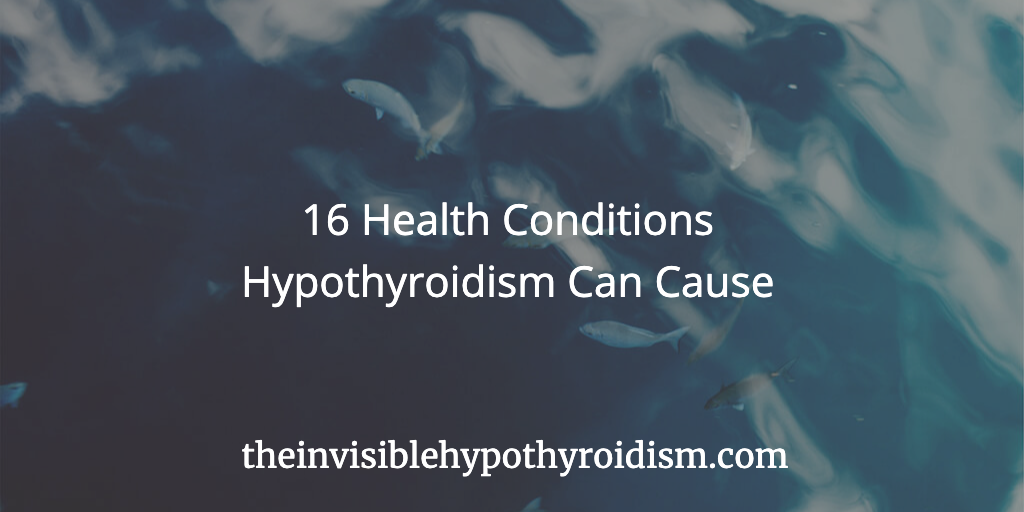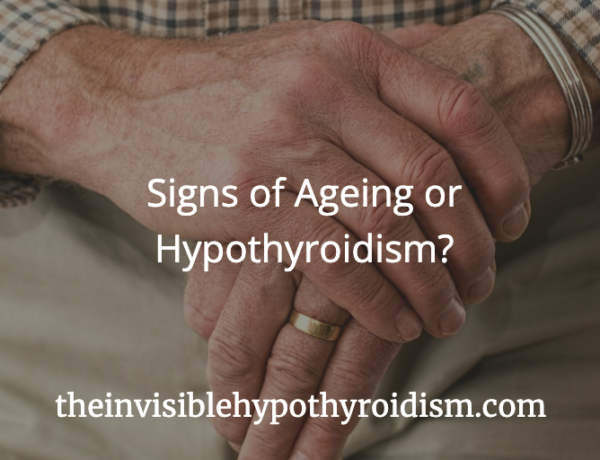Originally published on 19th April 2016 Last updated on 8th January 2024
An untreated thyroid problem, such as undiagnosed hypothyroidism, or non-optimally treated hypothyroidism can lead to a number of other health problems.
This is due to thyroid hormone being required for many bodily functions, so when we do not have enough of it, other issues can arise.
Understanding your symptoms of hypothyroidism and having regular tests to monitor it, will help to prevent any complications. I’m going to explore some known complications below.
1. Goitres or Nodules
Have you ever noticed your neck seems enlarged or been told it ‘sticks out’? Do you struggle to swallow or feel a lump in your throat? Experience a croaky voice or tenderness?
You could have an enlarged thyroid gland, also called a goitre, or a nodule. It can be slight or very noticeable and is usually caused when your thyroid over exerts itself. Read more here.
2. Mental Health Conditions
The symptoms of hypothyroidism can cause, be linked to, or have an effect on our mental health, such as depression and anxiety. I had both of these. The thyroid hormone T3 is incredibly important for mental health but many of us are low in it. Read more about hypothyroidism and mental health here.
3. Infertility
If thyroid hormone levels are not right, it can affect ovulation and decrease chances of conceiving. Miscarriages can also be caused by. low thyroid hormone levels in pregnancy. You can read more here.
4. Low Sex Drive and Impacts To Sexual Performance
Having a low libido or sex drive is seldom talked about, however, hypothyroidism can cause both men and women to feel a lack of interest in sex. Read more about this here.
Men specifically may also experience erectile dysfunction, infertility, low testosterone levels (which can cause lower sperm count while testicles might appear larger), lowered sperm mobility, slow facial hair growth, premature balding or thinning of hair and reduced muscle mass, from hypothyroidism.
5. Menstrual Problems
Along with many of the other symptoms of hypothyroidism, menstrual issues is a common one. Thyroid hormone is needed for pretty much every function and cell in the body so when your thyroid levels are off, many processes — including your menstrual cycle — can be affected. Read more on this here.
6. Low Vitamin Levels
Low levels in iron, ferritin, Vitamin D, B12 etc. are all common with hypothyroidism. It’s worth getting your levels checked and then ensuring they’re optimal, as they can be pretty simple to fix yet cause many symptoms.
7. Heart Problems
Inadequately treated hypothyroidism can affect the health of your heart [1], such as an increase in developing heart disease, and “bad” cholesterol, with high and low blood pressure also linked to thyroid problems.
Due to high levels of “bad” cholesterol, hypothyroidism can therefore also lead to a hardening of the arteries, which increases your risk of heart attacks and strokes. Read more here.
I had high blood pressure before my thyroid was properly treated.
8. Adrenal Dysfunction
If left a long time without correct treatment, your adrenal glands may work harder to keep you going during this time of stress. Read more here.
Many doctors don’t recognise adrenal dysfunction as a problem. Know that you can order your own testing from here and here.
9. Hypoglycaemia
Also known as low blood sugar, hypoglycaemia is linked to adrenal dysfunction, so having adrenal issues increases your chances of having this.
Research has shown that having Hashimoto’s also puts us at an increased risk of blood sugar imbalances or glycemic impairments and this then places extra stress on our adrenals, and around 90% of us with hypothyroidism have Hashimoto’s too.
10. Myxoedema Coma
Myxoedema Coma is a loss of brain function as a result of longstanding, severely low level of thyroid hormone. It is considered a life-threatening complication of hypothyroidism but is extremely rare these days. Don’t skip taking your medication!
Read more about this condition here.
11. Fibromyalgia
Although many thyroid patients are told they also have fibromyalgia, a separate condition to their hypothyroidism, and although it can be a separate health issue, it may actually be a symptom of a poorly treated thyroid condition.
Dr Barry Durrant-Peatfield covers this in his book. I’ve heard many patients say that once they were able to get out of their hypothyroid state, going by a full thyroid panel and raising Free T3 especially to optimal, their fibromyalgia improved or went away altogether.
A full thyroid panel consists of: TSH, Free T3, Free T4, Tpoab and Tgab.
You can order a thyroid panel test in the UK here and US here.
12. Muscle Pain/Myopathy
Muscle and joint pain, stiffness, cramping and spasming are well reported among thyroid patients. You can read more here, on one of my most popular articles of all time.
13. Chronic Fatigue Syndrome / ME
Another condition I have been diagnosed with in the past is Chronic Fatigue Syndrome.
This can be another sign of hypothyroidism not being optimally treated, and once your blood results (a full thyroid panel) read optimally, and you have optimal iron, ferritin, B12 and Vitamin D, etc. it may well just go away or improve a lot.
14. Obesity
Since low thyroid can lead to weight gain, this can result in being overweight and also obesity.
15. Stomach and Gut Problems
Another issue I’ve had whilst also being hypothyroid, is regular acid reflux.
Gut problems linked to hypothyroidism can also include GERD/GORD and low levels of stomach acid. The right amount of acid can help stop reflux.
If you get symptoms such as heartburn, acid on your chest or at the back of your mouth, you likely have stomach acid or gut health issues.
You need to be wary though that most medicine given for acid reflux issues can badly interact with Levothyroxine (and other T4-only meds).
16. Alzheimer’s Disease
Particularly interesting and quite scary, is Alzheimer’s Disease being connected to your thyroid levels.
A study found that:
“Women with TSH below 1.0 and those with a TSH above 2.1 had a greater than two-fold higher risk of developing Alzheimer’s Disease.” [2]
In contrast, they observed no such relationship between TSH levels and Alzheimer’s Disease risk in men.
Conclusion
It’s very important to say that I am of course not implying you’ll get or have any or all of the above, but they’re definitely worth keeping in mind.
Ensuring your thyroid levels are optimised can go a long way in preventing other issues, as well as making sure you’re having a full thyroid panel tested.
If your doctor won’t test the full thyroid panel, you can order your own here and here.
Have you been diagnosed with any other conditions?
You can click on the hyperlinks in the above post to learn more and see references to information given.
References:
[1] https://www.ncbi.nlm.nih.gov/pmc/articles/PMC5512679/
[2] https://www.ncbi.nlm.nih.gov/pmc/articles/PMC2694610/





